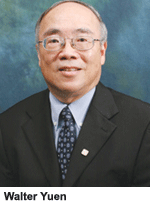A government keen to pump funding into universities, helping them prepare for a 30 percent increase in student numbers by hiring large numbers of extra staff: what sounds like an impossible dream for most Western universities is the reality in Hong Kong.
The territory is gearing up for the next stage of major education reform across its schools and seven universities. This will involve a switch from its British-style higher education model to one more akin to that of the US. In 2012, Hong Kong’s universities will shift from offering three-year degree programmes to broader four-year courses, necessitating a big injection of public funding to cope with the extra student numbers.
 Walter Yuen, Hong Kong Polytechnic University’s vice-president (academic development), is well placed to comment on the contrast between university life in East and West. He emigrated from Hong Kong to California when he was 14 and became an engineering professor and chair of the academic senate at the University of California, Santa Barbara. As Prof. Yuen approached retirement age, the opportunity to become involved in the Hong Kong reforms drew him to Hong Kong Polytechnic, where he is in charge of the switch to the new curriculum. Student numbers are expected to rise by 30 percent and the university will hire 100 extra staff to cope.
Walter Yuen, Hong Kong Polytechnic University’s vice-president (academic development), is well placed to comment on the contrast between university life in East and West. He emigrated from Hong Kong to California when he was 14 and became an engineering professor and chair of the academic senate at the University of California, Santa Barbara. As Prof. Yuen approached retirement age, the opportunity to become involved in the Hong Kong reforms drew him to Hong Kong Polytechnic, where he is in charge of the switch to the new curriculum. Student numbers are expected to rise by 30 percent and the university will hire 100 extra staff to cope.
On the other hand, the University of California system, where he studied and worked, is presently facing substantial cuts in state funding, accompanied by further tuition-fee rises. “Unlike most parts of the world, universities in Hong Kong don’t have a problem with funding,” says Yuen. “When a government is in this situation, I think there is an obligation to make things better.” Steve Tsang, senior research fellow in modern Chinese studies at the University of Oxford, argues that Hong Kong “has to invest in higher education because the only ‘natural resources’ it has to offer are human resources”.
.gif) The new curriculum at Hong Kong Polytechnic will require every student to fulfill substantial reading and writing requirements in both English and Chinese. They will also be expected to undertake community work, which will be assessed as part of their final degree scores. Simultaneously Hong Kong is abandoning its equivalents to GCSE and A-level qualifications and switching to a single school-leaving exam. Secondary school education will be shortened by a year and an extra year will be added to undergraduate study.
The new curriculum at Hong Kong Polytechnic will require every student to fulfill substantial reading and writing requirements in both English and Chinese. They will also be expected to undertake community work, which will be assessed as part of their final degree scores. Simultaneously Hong Kong is abandoning its equivalents to GCSE and A-level qualifications and switching to a single school-leaving exam. Secondary school education will be shortened by a year and an extra year will be added to undergraduate study.
In 2012, universities face a double cohort comprising the last pupils from the old school system and the first from the new one. This will be a shock for institutions, Prof. Yuen says, and the shift will place additional burden on the first students to study under the new system. “Frankly, there is a concern that a lot of students will not want to deal with this transition and will just go direct to the UK or Australia,” he says.
But Prof. Tsang believes that by switching to the US model of university education, Hong Kong will find it easier to harmonise its system with China’s. “The Chinese are looking more to the Americans than to the UK model,” he says.
(Excerpted and adapted from Times Higher Education)